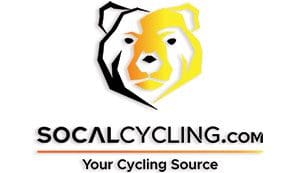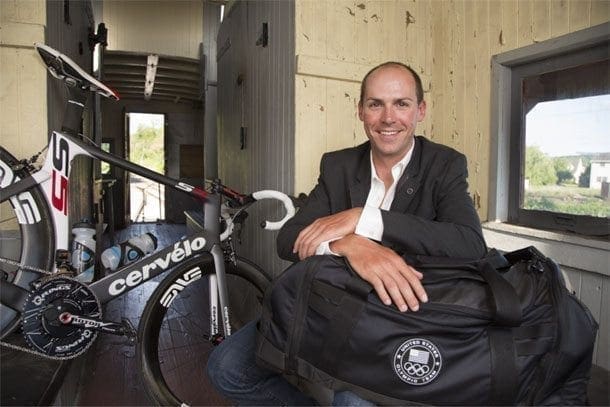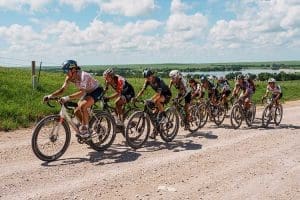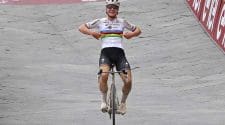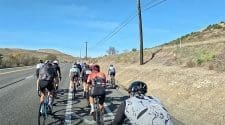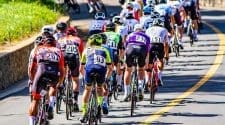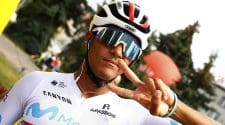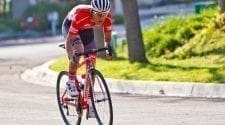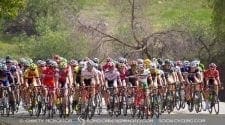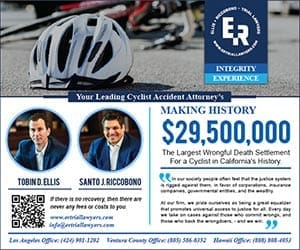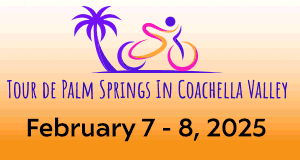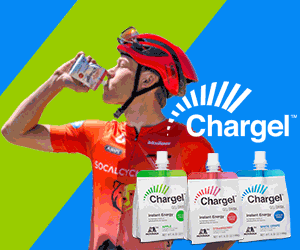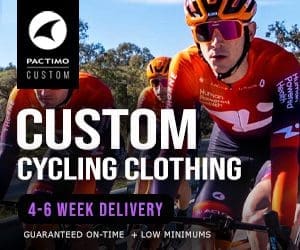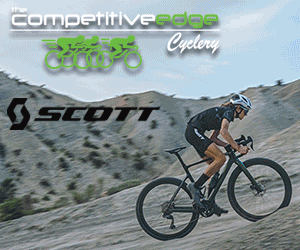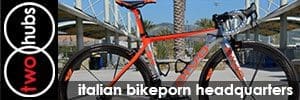Bobby Lea calls his main training site the VELO Sports Center at the StubHub Center while he gears up for the 2016 Olympic Games in Rio de Janeiro, Brazil. In preparation for 2016 Lea claimed the first-ever men’s omnium World Cup medal for the USA on Sunday November 9th when he finished third at round one of the 2014-2015 UCI Track World Cup in Guadalajara, Mexico. This is one of many accomplishments for this 31 year-old cycling pro who resides in Mertztown, Pennsylvania. As a 2-time Olympian, 3-time Pan American Champion and 23-time Elite National Champion, we could call him the Michael Jordan of this sport; a sport which is vastly under the radar and under publicized compared to mainstream sports including Football, Basketball, Baseball, or Soccer.
When we look at a successful athlete such as Bobby Lea, it is vitally important to look at tendencies, work ethic, and maturity. The “million dollar question” – How does one achieve such greatness? This is a greatness that is consistent year in and year out on the track. Lea is looked at as an icon and role model by his peers in the track cycling community. This is a behind the scenes look at Bobby Lea, his road to victory, the struggle, and everything in-between. This is the Bobby Lea experience.
Interview by Rich Kemp, Coordinator – VELO Sports Center
[SlideDeck2 id=17931]
RICH KEMP: When did you get into cycling, and why cycling over any other sport?
BOBBY LEA: Well, two good questions for me. The first, I got into cycling because my parents have been racing for decades now. They were racing before I was born, and when I was born they saw no reason to stop, so they threw me in the back of the van and away we went. So I really grew up in the sport. This is what I’ve known since I was a kid, and I think given that it is only natural that I expressed some sort of interest in bike racing. So I did my first little kid’s race at three and my bike would be in the car and they would throw me to whatever kid’s race was going on. I just kept progressing through, and never really had the good sense to stop. I played other sports as a kid. I had some interest in baseball, I played soccer in the fall, I did some basketball, but for the most part the spring sports were out of the question. My parents always said, “You can play baseball, or you can play lacrosse, but we are not driving you to the games, because we’ll be off racing our bikes.” In Pennsylvania I grew up on a farm fifteen minutes away from everywhere that was a nice way of saying no.
RK: Where did you go to school? Did you cycle at a collegiate level?
BL: I did, I graduated from Penn State in 2006 and I’m proud to say we have a very, very strong cycling program. That was a great place to race, and they are carrying on a strong tradition after me.
RK: Let’s get into sponsorships – how did you get hooked up with Custom Velo?
BL: Custom Velo is the online retailing branch of Pure Energy Cycling, which is a brick and mortar shop in Lambertville, New Jersey, and they have been supporting me since 2011. Custom Velo just launched in the middle of this season at Track Nationals, so it was a nice way to step up and get some sponsorship from a company that has broader appeal just outside of the little Lambertville area, because at the end of the day, once you get outside of a two-hour driving radius from a bike shop, there is not much that I can do for them. You know a bike race here in L.A isn’t going to get much business for a shop in New Jersey, so with customvelo.com, everywhere I go I can bring the message a little better.
RK: So, I noticed you at LAGP with the Red Cervelo bike – are you a flashy guy with the red look going on, what came about with that?
BL: The red bikes have been Cervelo’s trademark and brand, so to me it’s maybe almost like the Model T of track bikes, you can get any Cervelo you want as long as it’s red. But yeah it fits.
RK: You mentioned that your parents got you into track cycling. What was your first experience on a velodrome? Was it in Pennsylvania at Trexlertown?
BL: Yes, my home track is T-Town. I’ve been going there with my parents since the late 80’s to watch them race. I think I did my first races there probably in 1990, 1991.
RK: You mentioned Trexlertown, your home track, why did you decide to train here at the VELO Sports Center over other Velodromes? Why not the Olympic training center in Colorado where the Omnium team is based out of?
BL: Well, at least for the winter months, the weather is an easy one. It is hard to beat SoCal weather. With Colorado Springs it is kind of exciting for us [cyclists] they are putting a bubble over the track, so it becomes a viable training place in the winter, and if I’m not mistaken that’s supposed to be ready to ride sometime in January [2015]. So it is nice we are getting more options for training in the country because before it was, well even before this was built 10 years ago, you get nothing. You can go to an outdoor track in San Diego, or you go down to Florida, so now we really have all the great options.
RK: Did you ever entertain the idea of getting into road cycling since you’re an endurance guy?
BL: Actually I raced full time on the road for the last eight seasons. That was a lot of fun. I got to do a lot of really great races in the U.S, but at the end of the 2013 season, I was searching for a little bit more motivation, and getting a little fatigued on the domestic pro bike racing scene. I was searching for a bigger goal, a little more emotional stimulation with the training. Getting to the stage where I am in my career it seemed like a logical step, to take a step back from the daily grind and put all the eggs into the Rio basket, and try to pull out all of the distractions and control all of the controllable factors and do one really big push for Rio.
RK: What would you say to someone who is trying to get into track cycling, a beginner who wants to be the next Bobby Lea?
BL: Track is an interesting animal because it does happen, just outside of the limelight of pro bike racing; the big European road racing gets a lot of the attention. So I think to a certain extent there has to be a high level of internal motivation to be a successful track cyclist because a lot of your time is spent off in the dark corners away from the limelight. You do get the opportunity to perform on some of the big stages in the world, you get to ride the World Championships, you get to go to the Olympics, and that’s really cool, but those opportunities are so few and far between that you’ve got to be able to really hold onto those moments and look forward to them. It’s not like road racing where you get to race 70 times a year. But it takes a while, a lucky few jump on and find the success right away. I have been racing on the World Cup circuit ten years now. So it doesn’t always happen overnight.
RK: Obviously you are very successful on the track. What are your weaknesses on the bike? What are your weaknesses you are trying to exploit going to Rio for 2016?
BL: You are always learning a little bit more. I think on the bike, explosive power is one of my bigger weaknesses. I’m lucky now with the adjustment to the omnium format that it mitigates that to a certain degree. In the previous format, you really couldn’t afford to have a weakness at all. And if that was the case going forward to Rio, my training program over the next 21 months will have a pretty heavy focus on that because you can’t afford to drop an event. Now with the way the whole thing has been reconfigured with the bigger emphasis on the points race, it works out a little better for me. Now I can spend time working on that weakness, but I don’t have to get right up to the top. I can get to that point where I’m basically stemming the tide, not losing too much there. And still really work on the strengths.
RK: As a two-time Olympian (2008 & 2012), do you prepare for the Olympics differently than other Championships or Nationals races?
BL: Definitely, I guess the cliché is that it’s four years of work, but really it is and it isn’t. I walked away from London [2012] with kind of a 10,000 foot plan of what it was going to look like from then until Rio [2016] and it definitely gets broken down into phases – so the short answer is yes, it’s a different prep for the Olympics. Certainly the two years running up to the Olympics are a much more focused plan – for a Nationals at this point; it’s more about not trying to be fatigued going into these races. I try to fit it into the training as best as I can, but usually not looking to taper, not trying to mess up the bigger picture with the Nationals.
RK: So which Olympics did you enjoy more – 2008 or 2012?
BL: You know, they’re so different it’s hard to pick a favorite. The first one [2008] was amazing because that’s the realization of a dream, and you only get that first one once. So that’s always going to hold a special place no matter what. Pulling it off a second time was still pretty incredible. I think the big difference there is the first time the goal was to get there. I had no idea what it was going to take, what it is going to be like. Everything went in to making the team. It was, “Okay, take a deep breath. Holy —-, it worked. We’re going. Now what?” Maybe to a certain extent the results reflected that. London, it was a little more cut and dry. The selection wasn’t as tough, but it was still a big effort just to get qualified, and then that deep breath moment, “Holy —-, we made it. Now what?” This just happened about six months earlier, so there was a little more time to prep and I could be more focused on the results, but I think it’s hard – you really can’t pick a favorite, they’re both pretty incredible experiences, and unique.
RK: We talked about your Custom Velo as a sponsorship. Are you able to survive off sponsorships and winnings? Do you have a second job or career – Bobby Lea the Chemist?
BL: I’ve got some really great sponsors, like you mentioned; Custom Velo, Cervelo, Decomposits, and Rotor Cranks – these companies take really good care of me. So fortunately I don’t have to work. If it wasn’t for them [sponsors] it would be a different story. You can’t do this at the top level and still be working a day job, it’s hard enough sacrificing all the hours here just sitting in LA traffic [driving to the velodrome], how hard at the end is just find these 20 minutes, you know you’re trying to squeeze every last bit of daylight out, and if we were trying to run off and do a job on the side then you start cutting corners here and there, and maybe that works for a couple of weeks, but for a year, two years, three years – it starts to add up.
RK: Was there a turning point in your career where something clicked?
BL: If I had to pinpoint one big turning point in my career – I think it would have to start off with April or May before the London Olympics. I decided it was time to shake things up. I had stopped working with the coach I had been working with [for the previous 6 years ] and started working with Bryan Welton from Welton Endurance, and I think that was the big catalyst for what is going on right now because for the first time in my career I was really challenged as an athlete. Not just to perform at my best everyday – because coaches say they want to challenge their athletes, and perform at their best – but if you’re not internally motivated like that, no coach in the world is going to pull that out of you. It took basically every ounce of professionalism that I knew about, just to get through the workouts on the week-to-week basis. So simply doing the jobs laid out for me on a day-to-day forced me to kind of sharpen my skills, and make sure I was on point straight across the board. I think that has been the turning point two and a half years ago.
RK: Does cycling take away from your personal relationships with travel and constant training?
BL: Yes, it does – Personal and social life takes a toll for sure. It’s fortunate that I have a great group of friends and a supportive family who allow me to be M.I.A for big chunks of time. My social circles are about 2 ½ hours away from me – it’s nice that I can be gone all winter, and I’m not going to not miss a beat when I step back home.
[SlideDeck2 id=17936]
RK: Throughout your career, who would you say contributed to your success?
BL: Well certainly my late teenage years when I was navigating my way through college and starting to learn about elite level bike racing. Jim Young, who ran the Penn State cycling program, had a very heavy influence on trying to keep me pointed in the right direction. Since then it’s been – it’s been hit or miss. Sometimes more miss than hit. But I think it’s hard to pinpoint one single person or group. I have been lucky to have a very supportive family and friend’s network – but I think as far as the drive and the motivation to keep looking for that extra little bit that I have been missing, I think that’s an internal one.
RK: I see these cyclists on the infield with their headphones prepping for the race. What’s on Bobby Lea’s iPod before the race?
BL: I say more often than not if you catch me on the infield with my headphones on their unplugged and it’s just noise cancelling headphones.
RK: You like the quiet to clear your mind?
BL: I think there is enough going on inside my mind I don’t need to add any more noise [laughs], but I guess I’m kind of strange that way. I look around and I see everyone has their music, but it doesn’t – the only time I put the music in is when we go to really loud stadiums [velodromes], and you need just that little extra bit to drown out the outside noise. Otherwise I just prefer to stick to myself and work with my own thoughts and let the mind go and do what it does.
RK: I know you mentioned that you played other sports like baseball and lacrosse. If you weren’t riding a bike what would you be doing? What was your second passion…? Bobby Lea, third baseman for the L.A Dodgers?
BL: When I was in elementary school, I loved soccer. I thought playing in the World Cup would be pretty amazing, then I learned about the Olympics and that took over. I guess you could do the Olympics with soccer, but that never really stuck. As far as other sports, no – I guess bike racing took hold. Non-cycling passions… I’m kind of a nerd about antique motorcycles. I’ve got a couple early 70s CB 500s at home. I enjoy working on them. I have a project bike in the garage that’s slowly over the years turning into a Café Racer, so I think that qualifies as a non-cycling hobby right there.
RK: Did you ever look up to a particular racer? Or who was your role model growing up?
BL: Certainly within the sport, Greg LeMond was a big early influence. I was pretty in tune with – relatively in tune with cycling by late 80s and early 90s, Greg was a larger than life figure back then. That was probably my earliest influence from a big athlete. Other than that I don’t think I can point to one athlete or another that I’ve looked up to. I certainly find bits and pieces in a lot of different athletes across many different sports that I like, but to pick one person that’s a tough one.
Follow the VELO on Twitter and Instagram (@velosportcenter) and on Facebook.
